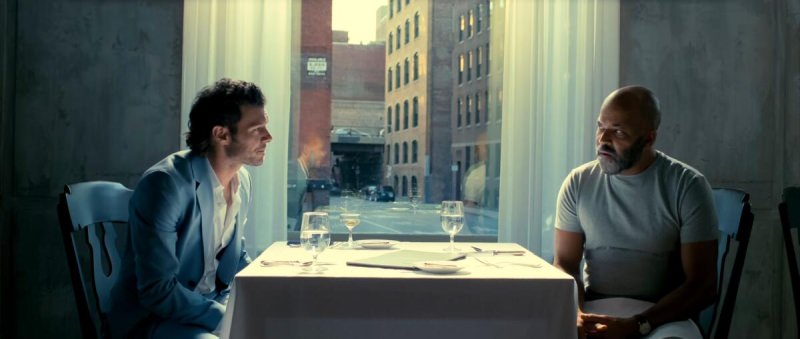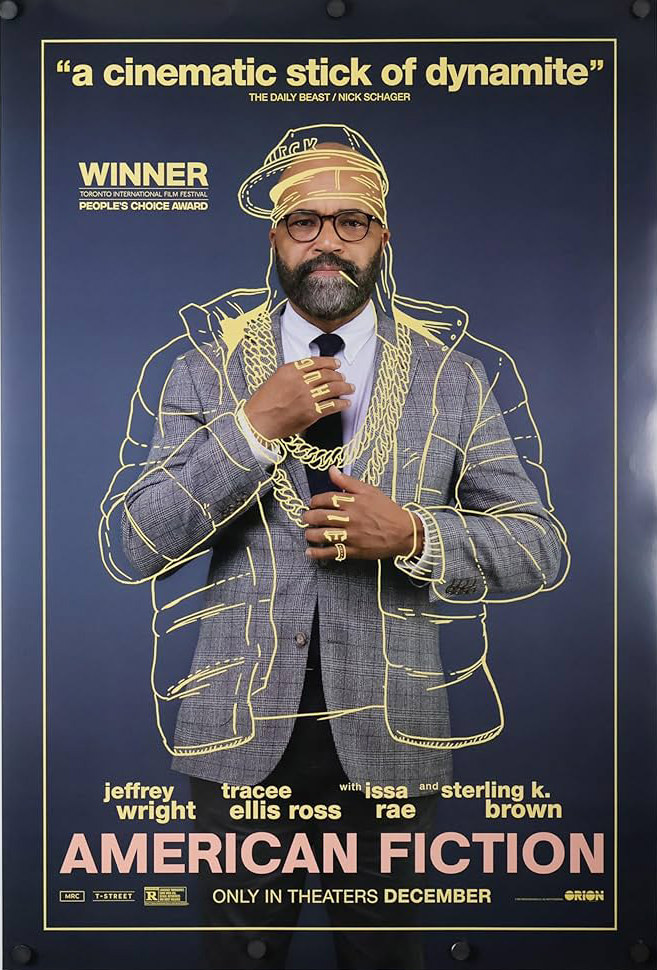American Fiction
Directed by Cord Jefferson (2023) ***1/2
 Genuine satire is getting to be a rarity in today’s cinema, which tends to bank on either grim and gritty or light and frivolous. Director Cord Jefferson’s film adaptation of Percival Everett’s novel Erasure (2001) is none of those things. Though it’s one of the best American films of 2023, it may not capture or appeal to the audience it needs, so do yourself a favor and see it in a movie theater.
Genuine satire is getting to be a rarity in today’s cinema, which tends to bank on either grim and gritty or light and frivolous. Director Cord Jefferson’s film adaptation of Percival Everett’s novel Erasure (2001) is none of those things. Though it’s one of the best American films of 2023, it may not capture or appeal to the audience it needs, so do yourself a favor and see it in a movie theater.
In American Fiction, Jeffrey Wright, an actor I’ve admired in shows and films as varied as The Batman (2022), Westworld, Boardwalk Empire and No Time to Die (2021), plays author and college professor Thelonious “Monk” Ellison. Monk’s a private, single writer of works based on Greek tragedies, who bristles at seeing his work in the “Black Authors” section of a bookstore and thinks some of his students are ideologically coddled.  His books are no longer selling, and his most recent manuscript is rejected for not being “black enough”. Forced to take a leave of absence from teaching, he heads back home to his family in Boston and to a Boston book festival. There he has an epiphany watching writer-of-the-moment Sintara Golden (Issa Rae) reading from her bestselling novel, “We’s Lives in Da Ghetto”, which he believes panders to its largely white, liberal audience by dwelling in the worst racial stereotypes.
His books are no longer selling, and his most recent manuscript is rejected for not being “black enough”. Forced to take a leave of absence from teaching, he heads back home to his family in Boston and to a Boston book festival. There he has an epiphany watching writer-of-the-moment Sintara Golden (Issa Rae) reading from her bestselling novel, “We’s Lives in Da Ghetto”, which he believes panders to its largely white, liberal audience by dwelling in the worst racial stereotypes.
Monk’s reconnection with his family, his mother (suffering from early onset dementia), played by Leslie Uggams, sister Lisa (Tracee Ellis Ross) and brother Cliff (Sterling K. Brown) are fraught with long-simmering tensions and unresolved conflicts. All of the family scenes, as well as a romantic subplot with neighbor Coraline (Erika Alexander), are deftly written and rich with life and subtlety of a kind not often used to portray African Americans in Hollywood movies (Jefferson, who also wrote the script, has previously worked on Succession, The Good Place and Watchmen). American Fiction is Jefferson’s directorial debut.
 When circumstances require a dire infusion of cash, Monk, in a fit of spite, bangs out on a typewriter the most cliche-ridden, stereotypical novel he can conceive, as a way of rubbing his publisher’s nose in it (first titled “My Pafology”, later a choice expletive). In grand “Springtime for Hitler” fashion, though, the gambit backfires; the pseudonymously published book becomes a huge bestseller, putting Monk into a series of quandaries and uncomfortable situations.
When circumstances require a dire infusion of cash, Monk, in a fit of spite, bangs out on a typewriter the most cliche-ridden, stereotypical novel he can conceive, as a way of rubbing his publisher’s nose in it (first titled “My Pafology”, later a choice expletive). In grand “Springtime for Hitler” fashion, though, the gambit backfires; the pseudonymously published book becomes a huge bestseller, putting Monk into a series of quandaries and uncomfortable situations.
American Fiction allows Wright to play a range we don’t usually see from him. All of the acting is first-rate and much of the film is sharply funny (Michael Cyril Creighton is particularly memorable as a very enthusiastic publisher). Only one thing keeps the film from being as great as it could be: the meta ending which fails to satisfy in the way it attempts to. American Fiction would be so much stronger — indeed, perfect — if a resolution had been written which incorporated and merged the family and romantic relationships with the book-publishing plot. While the original novel incorporated meta narrative devices, the family material written for the film is so vital, it feels shortchanged in the end. Though the novel is now over twenty years old, the issues it grapples with are still vital. I’m interested to see what project Cord Jefferson tackles next.
—Michael R. Neno, 2024 February 9